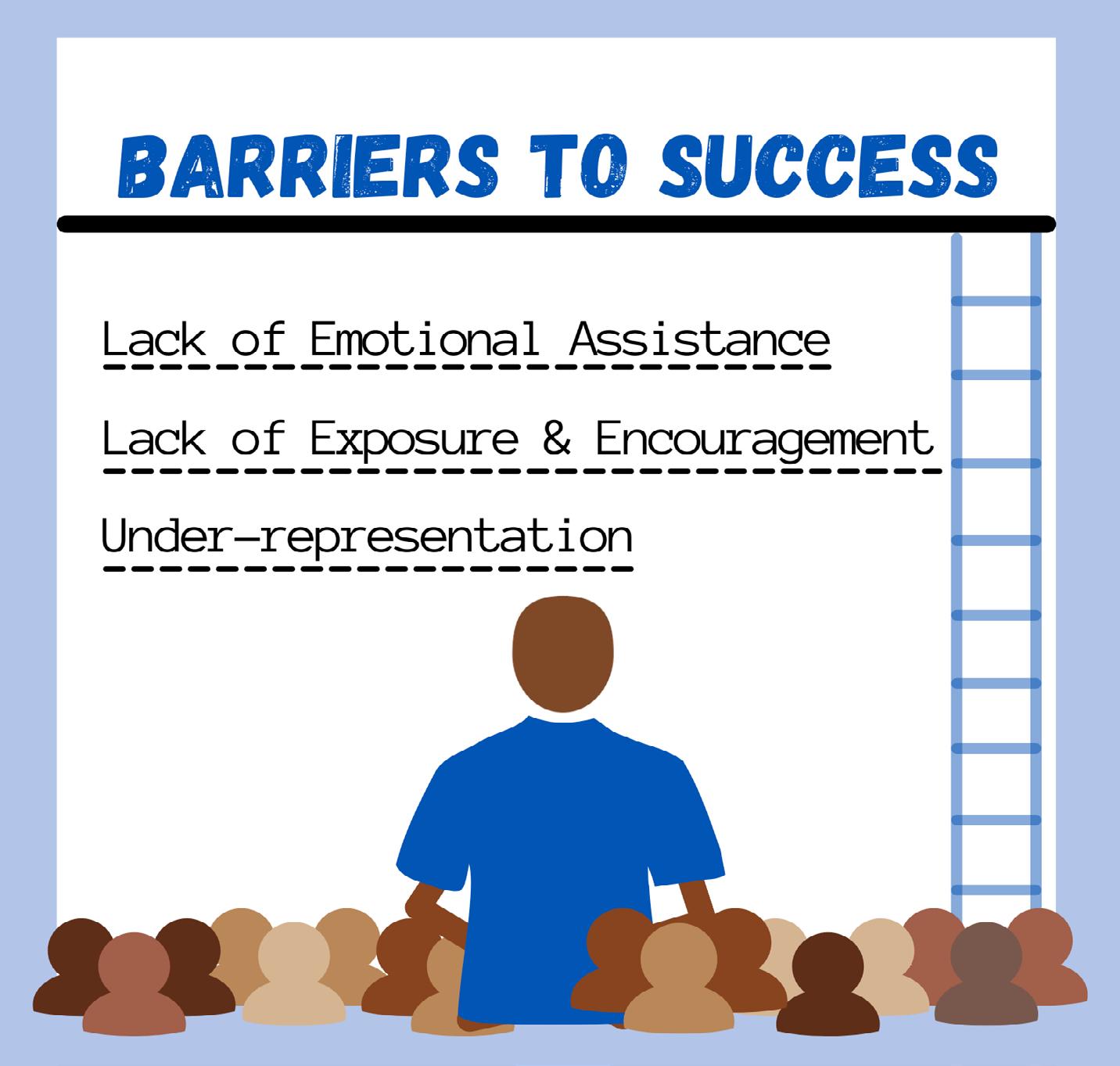
7 minute read
Barriers to dentistry for black dental students
As Budding Black Dentists, we aspire for there to be a more representative number of black people in dentistry and dental academia, both in the UK and across Europe. The onus is on our institutions and indeed our entire profession to make this a reality, and with urgency.
Jade Kwaku, Obioma Ukoha, United Kingdom
Advertisement
According to Norrie (2017), the 2nd most ethnically diverse occupation in England and Wales is dentistry, with 39.5% of the workforce being non-white. However, on further inspection, the General Dental Council’s (GDC) annual Registration Statistical Report (2020) states that only 2% of dentists and dental care professionals, registered with the GDC, identify as black. This is a very small proportion and given the advantages of having a more culturally competent health service, it would benefit the UK healthcare system and society as a whole to train and employ more black dentists. Culturally competent healthcare is defined as “the ability of systems to provide care to patients with diverse values, beliefs and behaviours, including the tailoring of healthcare delivery to meet patients’ social, cultural and linguistic needs” (Building a Culturally Competent Organization: The Quest for Equity in Health Care, 2011). The UK is steadily becoming more diverse, and according to Kings Fund in their analysis, Demography: future trends (2021), the percentage of minority ethnic groups residing in the UK should rise from 11% to 15% by 2031. Qualitative studies (Gibbons et al, 2000; Newton et al, 2001) have found that the black community and other minority communities experience barriers to accessing dental care, including language difficulties, cultural misunderstanding, and dental anxiety. To provide culturally competent oral care to patients, dentistry will have to become more inclusive as a profession. This would facilitate a system where clinicians are able to customise and influence healthcare and health promotion to better suit the needs of their patients, and bridge the disconnect between the dental profession and the black community. In order to employ more black dentists, more black people must qualify as dentists. The most current statistics tell us that the number of black students studying ‘Clinical Dentistry’ in higher education is 125 out of 5035 students in the UK – approximately 2.5% (HESA, 2021). This is a figure that can be improved upon, but only with a greater understanding of the motivations that encouraged current black dental students towards dental school and an appreciation of the barriers they faced. The student-lead, non-profit organisation Budding Black Dentists, sent out a questionnaire to black dental students about their journeys to and throughout dental school, with an emphasis on their motivations, perceived barriers and any support they received. In this article, we will be analysing the information received and identifying key themes and lessons that aid us in understanding better how to support members of the black community in progressing through the dental profession.
Encouragement with applications Regarding responses surrounding academic assistance with applications, the cohort was skewed towards primarily seeking online support. Many named organisations such as the African Carribean Medical Mentors (ACMM), or individuals privately offering
application support via social media platforms. One repondee wrote, “It was hard as I could only go to the Internet for help and I didn’t know anyone in the sector ” One particularly prominent barrier cited by multiple respondents was the lack of assistance received from their sixth forms and colleges. A common revelation was that the greatest obstacle in successfully applying for dentistry, was being assigned severely underpredicted A-Level grades. This factor - almost obstructing the chances of applying to dental school for many, and preventing many more entirely - is evidence of institutional racism in many of our schools. An interviewee recounted that their school put her in contact with a black dental student who previously attended the same school. She “solely depended” on the guidance and advice of this student alumnus who coached her throughout the dental application journey.
Exposure to the excellence For the majority of survey participants, the trigger point of when they actively began to consider dentistry as a vocation was their first interaction with a black dental clinician or healthcare professional. The visibility of a black role models, through media outlets, served as the most recurrent medium to attract students to pursue dentistry. TV cosmetic dentist, Dr Uchenna Okoye was one of few positive representations of the black community across the European media in the early 2000s. She proved an excellent “dental role model to young black females” and essentially was a symbol of divergence from the conceptualisation of dentistry being a “white” profession (Adams, 1998). The importance of familial clinical role models is also an influence which shouldn’t be disregarded. One member had “never met a black dentist” nor “seen any on social media or any media at all”. Instead, she was inspired by her mother whose occupation as a pharmacist who “...encouraged [her] to go down a similar path in healthcare”. Under-represented in the classroom The visibility of positive role models for young black students, is perhaps testament to the “powerful, often subconscious impact of doctor role-modeling in medical education” (Passi, 2016). However, this behavioural trend is still perpetuated throughout dental education, demonstrated through the inequitable ethnic distribution of clinical academics. According to a recent survey by the Dental Schools Council, 0.9% of clinical academics across all grades in the UK identify as black. The conglomeration of generalised ethnic discrimination and the denial of equal opportunities in employment, as made evident in the book ‘Racism in Medicine’, is one theory that may explain this statistic (Bhopal, 2007). For some current Budding Black Dentists, they report the difficulty in being severely under-represented in their field - often single-handedly shouldering the burden of “everyday racism” (Beagan, B.L. 2003). The trauma and psychological stress left from encountering recurrent racism via
evident biases, microaggressions and direct racism in their formative dental school years, perhaps acts as a repellent to then become clinical academics in the future (Berger and Sarnyai, 2015).
Effective emtional assistance Individual interactions can be emotionally damaging too. Applying to dental school despite discouragement from dentists - who underestimated an applicant’s chances of success - was truly detrimental to the self esteem and confidence for one respondent. One student who reapplied to dental school for a second time noticed a support system really helped attaining an offer at university for dentistry. They deemed the “painful” first attempt “would have been different had [they] had such a support system”. Ideally, a holistic support system should be made available to applicants tailored to their circumstances that incorporates both emotional support and encouragement for the applicant in tandem with the academic assistance and help through each stage and requirement of the application process. Throughout their career progression, mentorship, counselling and therapy may prove necessary when encountering habitual racism in the form of micro and macro aggressions. As Budding Black Dentists (BBD), we note that black dental students in the UK share similar backgrounds, ethnicities and thus experiences of racial prejudice, albeit to different extents depending on their external environments. Whilst the introduction of each individual into dentistry may seem somewhat divergent, one cohesive theme was the profound impact their heritage had on their Reflection The scarcity of quantitative data regarding the career progression of black dental professionals across Europe is testament to the dire need for more research to delve into this area of interest - including an analysis of drop-out and expulsion rates according to ethnic background. Nonetheless, the qualitative intelligence gained from listening to the experience of the black community, is equally compelling in discussions of racial inequity. Amplifying these marginalised voices allows for insight into how to best to rectify the inequalities within dental profession in the UK and throughout Europe. In the future, BBD will look to add to this body of research and widen the study population to a greater variety of black dental students and professionals from different countries and backgrounds. It will be insightful to find how the inherent intersectionality and multifacetedness of identity plays a part in the experiences of black students and professionals around the world. As a harmonious dental collective, we should endeavour to alleviate the barriers that disproportionately affect the black community to one day see a more diverse, inclusive and equal dental workforce. It is our ethical duty to strive towards a high quality, culturally competent service that universal healthcare systems ought to be.











